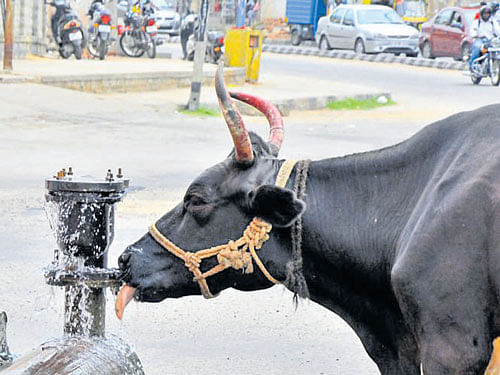
An ongoing study by a team of researchers from the Indian Institute of Science (IISc) has indicated that Bengaluru will soon face a huge water crisis. The study that is likely to be out soon says that if no immediate steps are taken, the city will go dry.
Prof T V Ramachandra from the Centre of Energy and Wetlands Research Group at the IISc said that despite floods in July 2016, the city is set to experience water crisis because of improper planning and ineffective implementation of the existing policies.
The Cauvery water dispute with the neighbouring Tamil Nadu will also have a bearing on the city’s water needs because of increasing dependence on piped water. This apart, the study points out that wastage due to leakages and indiscriminate use by people is also adding to the growing problem.
Prof Ramachandra said that Bengaluru annually receives 750- 800 mm rainfall while the city lakes can hold only 35 tmcft. “At least 98% water bodies in the city are encroached upon,’’ he said. Of the 35 tmcft water stored in the city lakes, 90% is sewage-fed water, the study points.
The Bangalore Water Supply and Sewerage Board (BWSSB) supplies 1400 mld everyday from Cauvery river. There are 9.15 lakh connections in the city. Their estimate shows that 1.4 lakh consumers should instal rain water harvesting systems, but only 62,000 have it. BWSSB is yet to reach out to 110 villages in the CMC and TMC areas.
The study also pointed out that Bengaluru generates 15 tmcft sewage water daily. Of the water used by Bengalureans, 70% is wasted and joins sewage lines and the rest is lost by various means like evaporation, leakage and others, the ongoing study by the team revealed.
The study also touches upon the water quality of most of lakes, revealing that they are highly polluted. Over 79% of city lakes fall under Class E category (for irrigation, industrial cooling, controlled waste disposal) and 29% lakes fall under Class D and E (can be used for wildlife and fisheries). The research team also showed that there has been an 88% loss in green cover in the city, a 79% loss in water bodies, a 925% increase in concrete land from 1970 to 2006 and over 75% of city land has paved surfaces.
“Unless water is used judiciously, rain water harvesting strictly implemented, inter-connectivity of lakes and drains restored, there will be severe water crisis, especially in the backdrop of less rainfall in the Cauvery basin. There is also a need to treat and recycle sewage water,” Prof Ramachandra explained.
Studyfindings
City has lost 79% water bodies.
There is 925% increase in concretisation
75% of city land paved
98% lakes encroached upon
90% lakes are sewage-fed